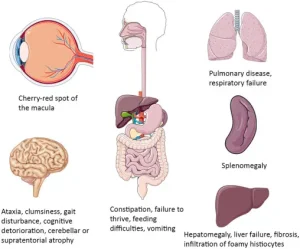Overview
Diagnosis
Diagnosis of Niemann-Pick disease begins with a physical exam. Early signs may include an enlarged liver or spleen. Your healthcare professional will discuss your symptoms and family health history. Because Niemann-Pick disease is rare and its symptoms overlap with other conditions, testing is necessary to confirm the diagnosis.
Diagnostic approaches vary depending on the type of Niemann-Pick disease:
-
Type A or B: Blood or skin samples are tested for sphingomyelinase levels in white blood cells. Sphingomyelinase is an enzyme that breaks down fat.
-
Type C: Blood tests measure oxysterol levels, a type of cholesterol. In some cases, a small skin sample is used to examine how cells store and move cholesterol.
Other tests may include:
-
Genetic testing: DNA analysis can identify specific gene changes responsible for Niemann-Pick disease. Testing can also identify carriers and help with family planning.
-
MRI: Imaging of the brain may show cell loss. MRI can also evaluate liver and spleen size, although early-stage brain changes may not be visible.
-
Eye exam: Can detect eye movement issues in type C or changes inside the eye in types A and B.
-
Prenatal testing: Ultrasound can detect enlarged liver and spleen in the fetus. Amniotic fluid or placental tissue samples may also be used to diagnose the disease before birth.
Genetic counseling is recommended for families with a child affected by Niemann-Pick disease to discuss risks and options.
Treatment
There is no cure for Niemann-Pick disease, but supportive care and specific medications can help manage symptoms.
-
Medicines:
-
Type B: Olipudase alfa-rpcp (Xenpozyme) is an enzyme replacement therapy administered intravenously every two weeks. It may improve lung function, reduce liver and spleen size, and support growth in children but does not affect nerve-related symptoms.
-
Type C: Miglustat may help slow neurological symptoms such as difficulties with hearing, swallowing, walking, mental function, and learning. Miglustat is taken 1–3 times daily, though it is not FDA-approved for this use in the United States.
-
-
Supportive therapies:
-
Speech, physical, and occupational therapy to maintain movement, speech, and swallowing abilities.
-
Nutrition therapy for swallowing difficulties.
-
Oxygen therapy for lung complications.
-
Symptom management for infections, seizures, muscle control issues, and sleep disturbances.
-
Regular monitoring by healthcare professionals is crucial because Niemann-Pick disease progresses over time. Ongoing research continues to explore new treatment options.
Advertisement

